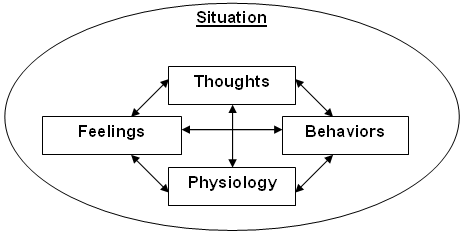 Every psychological theory attempts to understand how humans work by understanding the interconnection between their feelings, thoughts and behaviours. More recently, theories tend to include sensory experiences as well, as part of our normal interplay of experiences.(from michaelgrandner.com)
Every psychological theory attempts to understand how humans work by understanding the interconnection between their feelings, thoughts and behaviours. More recently, theories tend to include sensory experiences as well, as part of our normal interplay of experiences.(from michaelgrandner.com)
Cognitive Behavioural Therapy (CBT) comes from the theory that “what you think and how you act affects how you feel” and that by changing your thoughts and behaviours, you can change your feelings. This is been proven to be true, and CBT has been shown to be effective in many studies of depression and anxiety. With these issues in particular, as well as chronic pain, CBT can dramatically change a person’s perceptions from negative, dreadful or catastrophizing, to rational, positive and even hopeful.
It is the perceptions that are the key to mental health. Whether you see the glass as half-empty or half-full really does matter. We all have negative thoughts every now and then, but if we have a negative outlook or consistently apply negative interpretations to events, then we are likely to experience anxiety and depression. Even if we are in a state of pain, or have a legitimate problem, how you interpret the meaning of it makes all the difference.
Typical depressive thinking sounds like, “no matter what I do, nothing changes” or “nobody else cares, why should I?” These thoughts carry a weight of feeling with them – hopeless, despondent, helpless. If a person thinks thoughts like this consistently, they will end up feeling these emotions on a regular basis. These emotions change brain chemistry – the longer a person thinks and feels this way, the more the brain chemistry becomes stuck in a depressive state.
Similarly, with anxiety, thoughts may sound something like, “I’m such a loser, everyone will laugh at me if I try”, or “I’m going to forget something important and everything will be ruined”. These statements are negative about the person thinking them, global in scale (“everyone”, “everything”) and imply that a horrible event is going to happen and there’s nothing to do to stop it. They generate feelings of nervousness, loss of control, helplessness, dread. The brain responds to these feelings by increasing adrenalin in the body, to be ready for a crisis. For some, the adrenalin leads to a panic attack. For others, it becomes a low-level feeling of anxiety carried throughout the day.
In the case of chronic pain, the more adrenalin and “anxious” or “depressive” neurotransmitters are present in the brain, the greater the perception of pain sensations becomes. Studies have linked “catastrophizing” (that is, thinking thoughts full of dread) with greater perceived pain, and vice versa. Your pain can be managed better once your thoughts are capable of providing relief.
Behaviours may also reinforce these feelings and may create a “vicious cycle” that is hard to escape. One of the most effective remedies for depression is excerise, but motivation to act is sapped after thinking, “nobody cares so why should I bother?” The person may be tempted to reach for the junk food to self-soothe rather than to get up and go for a walk. So depressive beahaviours that are disengaged, neglectful or even self-harming tend to be negatively reinforcing the depression. And the pit gets deeper.
In the case of anxiety, reinforcing behaviours tend to be ones that may even seem logical in the situation. Imagine a person who has anxiety about driving, so avoids ever getting a license. Seems like a logical solution to get rid of the anxiety, however, it prevents the person from ever having to deal with the source of the problem.
Changing behaviours can be a quick path to dealing with problematic feelings. However, in CBT, it is usually both thoughts and feelings that are changed together. Since they negatively reinforced each other in the past, they can positively reinforce each other too.
If you feel ready to deal with what you think are problematic, negative thoughts and behaviours, which keep you stuck in a rut of negative feelings and inaction, call Hughes Counselling now. Megan Hughes can help you with depression, anxiety and pain management using CBT.
